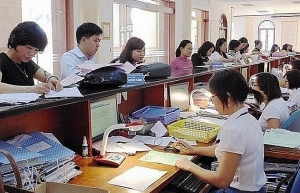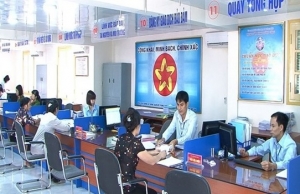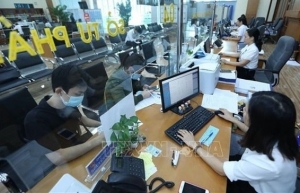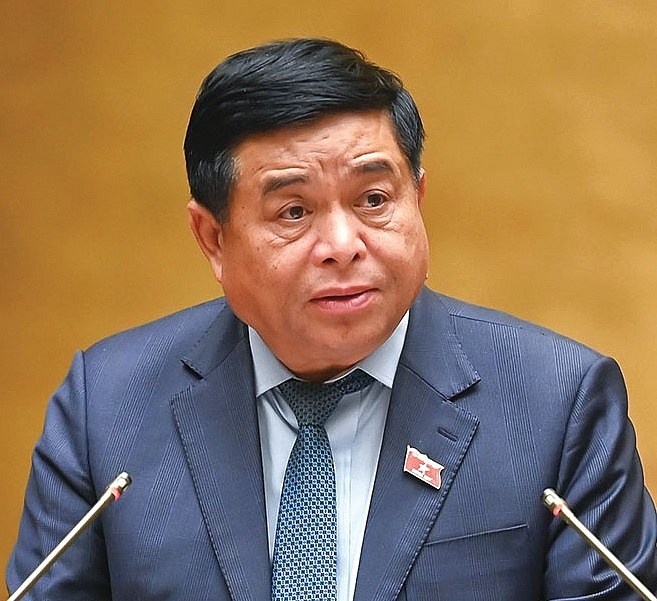Slashing of red tape remains focal point for admin reform
The government last week reported to the National Assembly (NA) that to realise its GDP growth target of 6-6.5 per cent, one of the biggest solutions is “to continue to cut, reduce, and simplify” administrative procedures and business regulations.
“Efforts are to be made to remove and decrease at least 10 per cent of compliance costs for administrative procedures and business regulations,” the government stated in a report sent to the legislature.
Specifically, the government will boost the effectiveness in solving administrative procedures under a one-door mechanism, while completing the upgrade and connection of information systems in service of tackling administrative procedures.
 |
| The nation is looking for a more streamlined approach to dealing with admin procedures, photo Le Toan |
In 2024, the government “will complete all decentralising administrative procedures that are subject to the power of the government and the prime minister, ensuring that at least 70 per cent of public services will be provided online and the rate of people performing such services will be at least 40 per cent.”
Since early this year, the government has cut, reduced, and simplified nearly 340 business regulations; simplified nearly 390 administrative procedures; and decentralised 156 administrative procedures.
“According to the global business environment report released in May by the Economist Intelligence Unit, Vietnam’s business climate ranking increased by 12 places,” said Prime Minister Pham Minh Chinh.
The urgent need to speed up the domestic business and investment environment has received special attention from the NA, whose members have highlighted their expectation that more complicated administrative procedures will continue to be erased and simplified.
“A number of bottlenecks have failed to be effectively removed. Despite some reductions, administrative procedures in many sectors remain complicated and cumbersome,” said the National Assembly Economic Committee (NAEC).
The NAEC cited the Provincial Competitiveness Index (PCI) released in April as showing that enterprises are facing numerous administrative obstructions which have caused high costs, including “the time for solving procedures being longer than regulations suggest” selected by over 60 per cent of total 12,000 enterprises surveyed.
In addition, businesses also said that they have had to “pay unofficial costs” and suffer from very long delays in determining land prices, while state officers fail to provide sufficient explanations in conducting procedures, and land prices fail to be in line with existing regulations.
“Of these issues, unofficial payments have become more popular for domestic private companies. According to the PCI, about 40 per cent of enterprises implementing land procedures have had to accept to pay such extra costs to have the procedure solved more quickly,” the NAEC pointed out.
NAEC Chairman Vu Hong Thanh also added that the enactment of some technical standards has made it hard for businesses and the public to follow.
“Enterprises have said that this has driven them into difficulties. Many standards are even higher than those in developed nations – for example, the standards on pollutants in foodstuffs; while enterprises are suffering from high compliance costs which cannot be obeyed – for instance current standards on fire prevention,” Thanh said.
Nguyen Thi Kien, director of a rice trading company in Hanoi, said that her company was finding it difficult to expand production due to fire prevention requirements.
“The current regulations on fire prevention are making it hard for enterprises,” Kien said. “If we invest about $200,000 into building a warehouse, we have to invest in an anti-fire system worth about $42,000, meaning 21 per cent of our capital – quite a big sum.”
According to Nguyen Minh Thao, head of the Central Institute for Economic Management’s Department for Business Environment and Competitiveness, this legal requirement is too stringent. “Some businesses with investment in warehouses cannot spend such big money installing such a costly anti-fire system,” she said.
PM Chinh committed that the government will resolve bottlenecks and remove difficulties for production and business activities, and domestic enterprises, especially when it comes to legal issues, output markets, capital accessibility, and capacity to absorb capital and labour.
“Besides this, the government will continue focusing on reducing and simplifying administrative procedures and business regulations, while promptly removing problems related to technical and economic standards and norms that are not really appropriate, so that inappropriate procedures and regulations do not arise,” PM Chinh said.
Additionally, the government will also effectively implement business support programmes, he said.
According to the Ministry of Finance, in 2023, a package of about $8.44 billion is earmarked for supporting businesses in the form of tax exemption and reduction. So far, more than $5.48 billion has been realised. Going forward, another $2.74 billion from budget revenue last year will be added to the package.
According to the Ministry of Planning and Investment (MPI), Vietnam saw an estimated index for industrial production (IIP) for October increase 5.5 per cent on-month and 4.1 per cent on-year. In the first 10 months of this year, the IIP is estimated to climb only 0.5 per cent on-year – far lower than that in 2022 (98.9 per cent), 2021 (3.8 per cent), 2020 (2.6 per cent), and 2019 (9.5 per cent).
The first 10 months of 2023 saw 81,000 businesses halt operations, up 22.1 per cent on-year; 50,700 stopped operations or waited for dissolution, up 25.9 per cent on-year; and 14,700 completed such procedures, down 4.5 per cent on-year. On average, about 14,700 businesses left the market every month.
| Nguyen Chi Dung - Minister of Planning and Investment
In addition to short-term solutions, the government is also focusing on combining long-term and fundamental solutions, and in October, we saw relatively positive signs such as rises in disbursement of public investment, foreign investment attraction, private investment, exports, and domestic consumer demand. Going forward, we will continue to closely follow the Party and the National Assembly’s (NA) policies and resolutions to come up with solutions and implement them more effectively and decisively. The Programme on Socioeconomic Recovery and Development is a sound and timely policy that provides direct support to businesses and individuals. It has also produced positive results since early this year. In addition to this support, we have also spent more than half of the programme’s resources on socioeconomic infrastructure investment. All important projects and key national strategic projects are currently being implemented very positively. For these projects, we have spent $7.42 billion out of $14.2 billion of the entire programme on infrastructure investment. However, there is a policy that we have not achieved the desired results: the 2 per cent lending rate support package via the commercial bank system for enterprises, cooperatives, and household businesses. There are two main reasons behind the slow disbursement. Firstly, mainly due to the difficult economy, many businesses that are eligible to borrow do not borrow, while some businesses that want to borrow do not qualify for loans. Secondly, the scheme’s design is very cautious. Projects eligible for loans from this package must show their “recovery ability”, which has confused lenders and borrowers. Currently, only 2 per cent of the package’s assigned total $1.69 billion has been disbursed. The government has asked the NA to allow it to continue implementing this package until the end of 2023. If it is not successful, it will be cancelled. This is an account that we have not yet issued, so it does not affect state budget overspending. Instead of this 2 per cent interest rate support policy, we will continue to apply for extensions and postponement of VAT and other types of taxes to support businesses. * Excerpt from speech at the ongoing 6th session of the National Assembly |
 | Vietnam moves to accelerate administrative reform in 2021-2030 Vietnamese Deputy Prime Minister Pham Binh Minh on September 2 signed Directive No.23/CT-TTg on boosting the Master Programme on State Administration Reform for 2021-2030 to meet future national development needs in the digital age and increasingly growing international integration. |
 | PM requests intensifying administrative reform, business climate improvement Prime Minister Pham Minh Chinh on June 1 signed a document requesting all public agencies and localities intensify their work for effective administrative reform and business climate improvement. |
 | Deputy PM urges prioritising administrative reform in business Administrative regulations and procedures in investment and business should be simplified and reformed first, Deputy Prime Minister Tran Luu Quang said at a recent meeting on administrative reform and improving the efficiency of policy consultation to the Government and the PM. |
What the stars mean:
★ Poor ★ ★ Promising ★★★ Good ★★★★ Very good ★★★★★ Exceptional
Related Contents
Latest News
More News
- US firms deepen energy engagement with Vietnam (February 05, 2026 | 17:23)
- Vietnam records solid FDI performance in January (February 05, 2026 | 17:11)
- Site clearance work launched for Dung Quat refinery upgrade (February 04, 2026 | 18:06)
- Masan High-Tech Materials reports profit: a view from Nui Phao mine (February 04, 2026 | 16:13)
- Hermes joins Long Thanh cargo terminal development (February 04, 2026 | 15:59)
- SCG enhances production and distribution in Vietnam (February 04, 2026 | 08:00)
- UNIVACCO strengthens Asia expansion with Vietnam facility (February 03, 2026 | 08:00)
- Cai Mep Ha Port project wins approval with $1.95bn investment (February 02, 2026 | 16:17)
- Repositioning Vietnam in Asia’s manufacturing race (February 02, 2026 | 16:00)
- Manufacturing growth remains solid in early 2026 (February 02, 2026 | 15:28)


 Tag:
Tag:
















 Mobile Version
Mobile Version